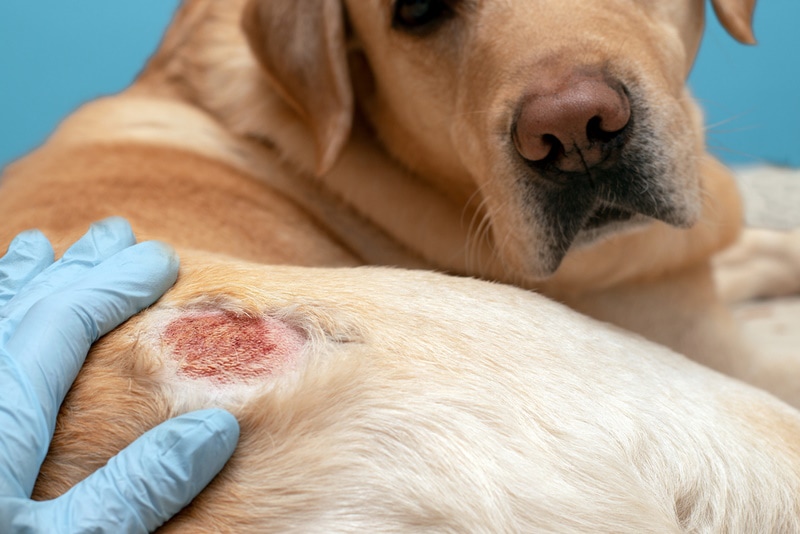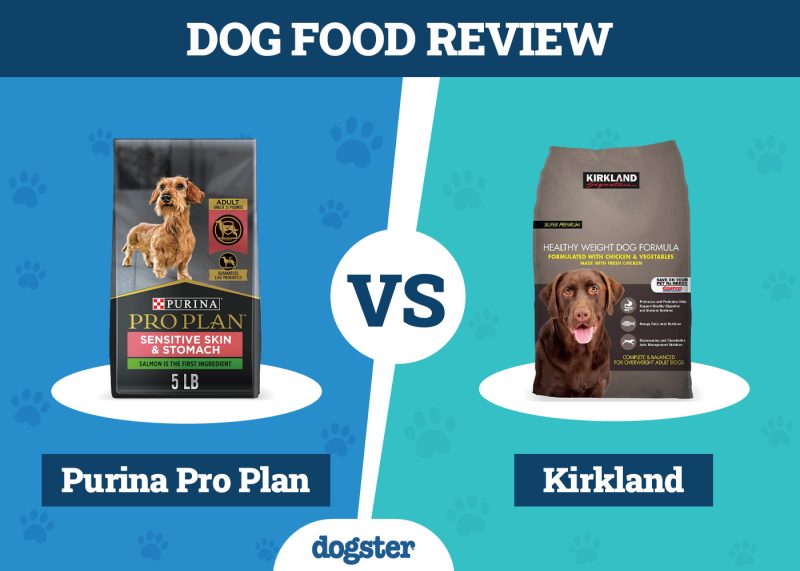In this article
View 3 More +Steroids (glucocorticoids/corticosteroids) have been among the most commonly prescribed medications in veterinary medicine since the 1950s. Synthetic glucocorticoids like prednisone and prednisolone treat various canine health problems, such as canine dermatitis.
Although prednisone is effective in managing inflammation, allergies, autoimmune diseases, and other illnesses, its use can cause side effects in dogs, and some are more severe than others. Here’s what dog owners should know about the worst risks of giving prednisone to their pets.

Why Is Prednisone Used on Dogs?
Prednisone belongs to a class of medications known as corticosteroids, which mimic the effects of hormones produced naturally by the adrenal glands. It works by suppressing the immune system and reducing inflammation, making it useful in treating a wide range of canine health issues, including:
- Allergic reactions
- Itching
- Hives
- Skin diseases (dermatitis)
- Arthritis and orthopedic diseases
- Nervous system disorders
- Inflammatory bowel disease
- Asthma
- Cancer
- Autoimmune diseases like lupus and autoimmune hemolytic anemia
Common Side Effects of Prednisone in Dogs
While many dogs tolerate prednisone well, some may experience mild side effects, such as increased thirst, excessive production of urine (polyuria), appetite changes, and mild behavioral changes. For example, according to a 2023 study on the side effects of this drug on a small sample of 45 dogs, 90% experienced changes like increased thirst and appetite by day 14.1 Fortunately, these effects are often transient and resolve once the medication is discontinued or the dosage is reduced.

The 5 Long-Term Use Risks of Prednisone in Dogs
Prolonged treatment with prednisone may pose more severe risks to a dog’s health. It can lead to adverse effects like gastrointestinal problems, weight gain, muscle weakness, and skin problems. Additionally, it may suppress the natural production of cortisol by the adrenal glands, leading to adrenal insufficiency if treatment is stopped abruptly.
The previous study mentions that the adverse effects of glucocorticoids like prednisone generally result from long-term use at high doses to control certain inflammatory or immunological disorders. These side effects generally disappear when treatment is stopped.
However, the prolonged use of high doses of prednisone can cause serious health problems, including the following.
1. Gastrointestinal Ulcers
Serious side effects of a high dose of prednisone include gastrointestinal ulcerations, which can cause loss of appetite, black or bloody stools, bloody vomit, or high fever. Giving the medication to your dog with food may reduce these effects, but if stomach problems are severe, treatment may need to be stopped, so you’ll have to talk to your vet.

2. Behavioral Changes
Some dogs exhibit behavioral changes while taking prednisone, ranging from increased excitability and agitation to depression and aggression. Sudden behavioral changes, especially aggression, linked to prolonged prednisone use can be particularly surprising and worrying to dog owners, who do not understand why their usually calm canine companion might suddenly act unstable.
3. Endocrine Disorders
Prednisone can disrupt the delicate balance of hormones in a dog’s body, potentially leading to conditions like iatrogenic Cushing’s disease. In this condition, the adrenal glands overproduce certain hormones, such as cortisol. Excessive production of this hormone may be life-threatening for the dog.

4. Impact on Bones and Joints
Long-term use of prednisone can have detrimental effects on a dog’s bones and joints. It can interfere with calcium absorption and increase the risk of bone loss, osteoporosis, fractures, and joint problems like osteoarthritis.
5. Hyperlipidemia
Hyperlipidemia occurs when there are too many fats in the blood, such as triglycerides or cholesterol. Medications, especially corticosteroids like prednisone, can cause high lipid levels.
Usually, a dog with hyperlipidemia does not show any signs. Veterinarians often find it during routine blood tests. If there are clinical signs, they are usually gut-related, such as vomiting or diarrhea. Sometimes, excess lipids can affect the eyes, causing white spots or inflammation that can lead to blindness. Skin problems like itching and hair loss may also occur. Severe cases can cause seizures, but they’re rare.

Increased Risk of Side Effects for Overweight Dogs
Interestingly, the results of a 2022 study suggest that administering glucocorticoids like prednisone to overweight dogs may put them at increased risk of developing side effects. Indeed, the risks of developing polyphagia (excessive need to eat) during treatment were increased by 30% for every 5 kg of additional body weight in dogs. Nearly half of the dogs fluctuated more than 15% from their initial weight during treatment. Additionally, these dogs were also at increased risk of developing a urinary tract infection during treatment.
If you are concerned about the health and well-being of your pet, seek veterinary advice for the best course of action.
If you need to speak with a vet but can't get to one, head over to PangoVet. It's our online service where you can talk to a vet online and get the advice you need for your dog — all at an affordable price!


Conclusion
Although prednisone can be an effective and safe treatment for various health conditions in our canine companions, it is essential to be aware of the side effects and risks associated with its prolonged use. The best way to minimize a medication’s adverse effects on your loyal four-legged friend is to work with your veterinarian. They can closely monitor the treatment’s effects on your dog, adjust the dosage if necessary, and explore alternative treatment options if deemed appropriate.
See Also:
- 20 Goldendoodle Facts: Get to Know a Hybrid Dog Breed
- Goldendoodle Breed Info: Pictures, Traits, Info, & Care
Featured Image Credit By: luchschenF, Shutterstock


















